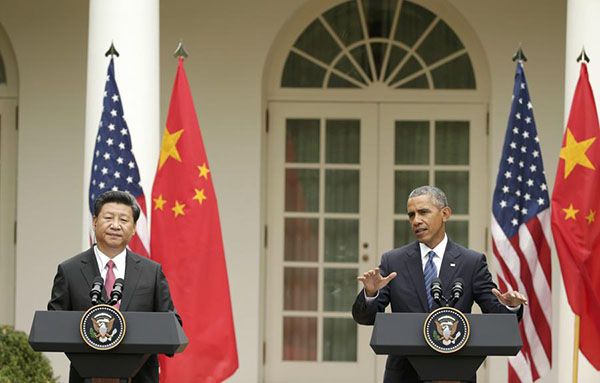Xi, Obama outline joint vision to combat global climate change
|
|
 |
|
US President Barack Obama (R) and Chinese President Xi Jinping hold a joint news conference in the Rose Garden at the White House in Washington, September 25, 2015. |
President Xi Jinping and his US counterpart Barack Obama outlined their common vision for a global climate change agreement on Friday, including new steps they will take to deliver on pledges made in 2014 to slash their greenhouse gas emissions.
China will launch its national emission trading system in 2017, covering key industry sectors such as iron and steel, power generation, chemicals and building materials, to help contain the country's emissions, said the US-China Joint Presidential Statement on Climate Change.
The emission trading systems, which started its operations from the United States early in 1977 and was followed suit by other western countries, including Germany, England and Australia, put limits on carbon emissions and open up markets for companies to buy and sell the right to produce emissions.
China's proposed cap-and-trade system would create the world's biggest carbon market.
The joint presidential statement was a highlight of a state visit to Washington by Xi, as the two leaders tackled difficult issues such as cyber security and China's economic policies.
It built on the US-China Joint Announcement on Climate Change last November, when the United States pledged to reduce its greenhouse gas emissions 26 to 28 perceht below 2005 levels by 2025, while China agreed to cap its rising emissions by at least 2030.
The statement aimed to show "the determination of both countries to act decisively to achieve the goals set last year."
"For the world's two largest economies, energy consumers and carbon emitters to come together like this, there is no reason for other countries, whether developed or developing, not do so as well," Obama told a joint press conference with Xi.
China also commits to promote low-carbon buildings and transportation, with the share of green buildings reaching 50 percent in newly built buildings in cities and towns by 2020 and the share of public transport in motorized travel reaching 30 percent in big- and medium-sized cities by 2020, according to the joint statement.
China also announced on Friday that it would channel 20 billion yuan ($3.14 billion) for setting up the China South-South Climate Cooperation Fund to help developing countries combat climate change, a significant financial pledge from an emerging economy.
The United States reaffirmed a pledge it made last year to allocate $3 billion into a UN-backed Green Climate Fund.
China, as the world's largest carbon emitter, also announced for the first time that it will join the United States, Britain, the World Bank and other countries and institutions to "strengthen green and low-carbon policies and regulations with a view to strictly controlling public investment flowing into projects with high pollution and carbon emissions both domestically and internationally."
China and the United States also agreed on the need for an "enhanced transparency system" in a United Nations climate agreement to ensure trust and confidence in the framework to be agreed at the Paris Climate Conference in December.
The two sides recognize that their mitigation efforts are "crucial steps in a longer-range effort to transition to low-carbon economies," the joint statement said.
